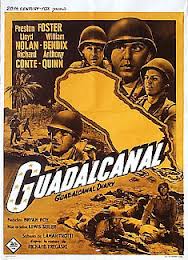
GUADALCANAL DIARY
US, 1943, 93 minutes, Black and white.
Preston Foster, Lloyd Nolan, William Bendix, Richard Conte, Anthony Quinn, Richard Jaeckel, Lionel Stander.
Directed by Lewis Seiler.
Guadalcanal Diary is based on a diary by Richard Tregaskis and the screenplay incorporates a voice-over which is rather literary and rhetorical. The film was a contribution by 20th Century Fox to the war effort in the Pacific. It is very gung-ho in many ways (at least seen in retrospect) with rather jingoistic and racist comments - although, the marines develop an admiration for the battle skills of the Japanese.
The film focuses on the first land battle of the war in the Pacific, only six months after the bombing of Pearl Harbor. The fleet and the marines went to the Solomon Islands, made a landing on Guadalcanal, the Japanese retreating. However, after some time the Japanese fought back and there was a very fierce battle. At the end of 1942, the marines pulled out and the army moved in to continue the war in the Pacific.
Preston Foster gets top billing as the chaplain from Notre Dame University, a commonsensed man's man chaplain. William Bendix has the opportunity for some comedy, harking back to Flatbush and Brooklyn. Very young Richard Conte, Anthony Quinn (in his twenties still but looking older) and Richard Jaeckel as a teenager appear as some of the troops.
The film is an interesting re-creation, done so soon after the actual battle, of the war in the Solomons.
1. The impact of the film in its time? War propaganda? The war effort? Morale-boosting? A portrait of American marines in action in 1942?
2. The situation of the war at that stage, the bombing of Pearl Harbor, the Japanese invasions of Asian and Pacific countries? The might of the Japanese empire, army, navy and air force? The confrontation with the Americans? The Americans and their confidence that they could beat the Japanese? The comments on the Japanese as fanatics? Their fierce loyalty to the emperor?
3. Black and white photography, the atmosphere of the Solomon Islands and the Pacific? The opening, the men lazing on the ship, the heat of the tropics? The island itself and the sea, the landing and the vivid presentation of the landing, unopposed? The island itself, the airstrip, setting up the base? Jungle warfare? Beach warfare and the massacre of the troops on the shore?
4. The voice-over and its comment on the action, explanations? Its rhetorical tone?
5. The presentation of the troops, their backgrounds, the call-up, their patriotism? Training? Life on-board, the religious service on the Sunday, the men talking, games? The men together, recreation, the dancing? The ordinary life on the boat?
6. The chaplain, strong man, the ceremony? His being with the men, able to talk with the authorities, giving the last rites to those who were killed? Having the men's confidence? His sense of humour, joining in the Irish dancing? The various officers, their personalities, their strategies, the command? The loss of men? Friendships from the past? The focus on Jesus Alvarez? The heroics of the film being left to him, the rescue from the beachhead, the pursuit by the Japanese, his swimming back to safety? The cooks? The youngster, his inexperience, the comments about his whiskers, his talk about girls, the letters to his mother? The warning about souvenirs, his trying to get the sword, his being shot?
7. The moulding together of a military troop, the training, the experience, the hardships and the rain, hunger, the snipers, the attacks? The medical and hospital workers?
8. A realistic portrait of action in World War II filmed at the time? In retrospect?